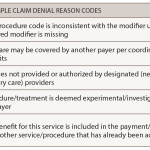In an already complicated reimbursement landscape, claims denials can potentially pose a serious issue to the financial revenue for rheumatology practices. Denials are not only highly prevalent in the healthcare environment, but also costly to appeal, which affects overall reimbursements. According to The Physician Billing Process: 12 Potholes to Avoid in the Road to Getting Paid, it costs a physician practice approximately $15 per claim to rework a denied service, which includes staff time, interest and practice overhead (MGMA 2009).
Although denials happen across the entire revenue cycle in a practice, a large percentage is associated with front-end processes, such as registration, authorization and eligibility. Thus, practice administrators and physician leaders must identify the root cause for denials. Most practices can utilize data available from the revenue cycle management processes to analyze and determine where denials are occurring, paying special attention to such areas as patient registration, medical chart documentation, coding and billing errors, as well as payer behavior.
Once problem areas are identified, practice leaders should prioritize the areas that will have the greatest impact on the practice’s bottom line. It is important to know if the problem can be drilled down to a specific payer, department or clinical area to understand if the dollar impact is due to an inefficient process or errors in a specific area. This could help staff understand that some of the high-priority issues may require a process redesign. Additionally, many claims denials start at the front desk as registration and eligibility accounts for 23.9% of all denials in the U.S., with 10% accounted for by non-covered services. Along with ineligible services, manual errors and patient data oversights, such as a missing or incorrect patient identification number, a missing date of birth or insurance ineligibility can cause a major impact, causing claims to be denied. Practices should identify software to work with their practice management system with built-in eligibility checking to streamline the check-in process and help reduce administrative mistakes. This will help the practice guarantee the registration data are accurate, complete and consistent to ensure claims go out clean and the practice gets reimbursed faster.
Prior authorization and precertification issues account for 18.2% of denials in the U.S. Because these issues account for such a high number of denials, rheumatology practices must make sure they understand the real reasons claims are denied for authorization. Was prior authorization obtained? Did it expire? Was the claim filed for the correct procedure? Practices should implement appropriate medical necessity business rules to better guide the billing process and avoid authorization mistakes.
As the year comes to a close, practices should review their revenue cycles to make sure the claims process is effective. Claims should have a review process to look for errors and make appropriate edits before they’re sent to the payer. While each payer has different requirements and formatting preferences, practices should be able to review each claim in a timely manner to verify accuracy and file clean claims to the best of their ability.
Rheumatology practices should look more closely at their denials management. Reports have shown that more and more physician practices are turning to denials management to maximize their bottom dollar. The reason: Practices nationwide have a 5–8% claims denial rate, and reports show that 50% of denied claims are never refiled. With a denials management program in place, 90% of denials are preventable, and 67% are recoverable. Practices should create proactive processes and ongoing analysis across the revenue cycle to manage denials by monitoring internal processes, employee skillsets and the benefits of implementing necessary technologies to optimize denial-prevention strategies.
This is not a one-time action, but an ongoing process to prevent unpaid claims that result in lost revenue. It will take time, but the outcome will be well worth it.
If you need more information or assistance in creating a denial-management strategy for your practice, send an email to the ACR Practice Management Department at [email protected].



